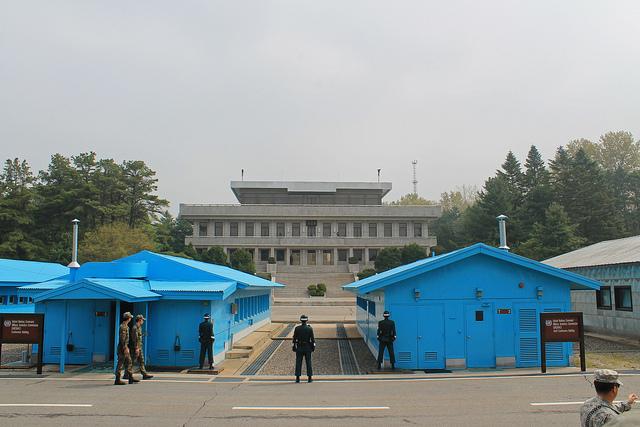North Korea: what now?
Posted By Tom Switzer on September 4, 2017 @ 14:30

North Korea’s sixth—and most powerful—nuclear test is part of a pattern of escalating belligerence. As a result, the UN Security Council will issue yet another resolution condemning Kim Jong-un’s blatant violations of previous council resolutions. And it will set out to impose yet another round of sanctions on the hermit kingdom. Calls for a tougher response, including even a pre-emptive strike on Pyongyang, will grow louder.
How will President Trump react? Truth be told, he doesn’t have much room to manoeuvre.
Any effort to lavish attention on Pyongyang and offer it political and economic favours would be as foolish as it is unlikely. Presidents Bill Clinton and George W. Bush tried that approach, which just handed North Korea a string of bribes in exchange for ending its provocations, suspending its nuclear activities and entering diplomatic talks.
In each case, however, Pyongyang failed to fulfil its commitments and eventually returned to producing weapons, testing missiles and escalating the war of words with Washington and its allies. So diplomacy won’t work, at least for now.
But neither is there any viable military option available. A pre-emptive strike against Pyongyang may provoke the very action it’s designed to prevent. North Korea has nuclear weapons, which the regime can use. It still has formidable conventional artillery, which it can use to hit Seoul. A US strike against North Korea would be unlikely to have the support of America’s key Asian allies. But China would come to the North’s rescue, and there’s no telling where that would lead.
Nor is Beijing much help in coercing Pyongyang into giving up its nukes. China needs North Korea for geopolitical reasons. The collapse of the regime would spark a refugee crisis and probably unite the Korean peninsula under the US security umbrella. If you think Russia is too sensitive about a Western bulwark on its doorstep, how do you think China would respond to a Western bulwark in its own sphere of influence? Remember that China entered the Korean War in late 1950 when US-led forces moved towards its border. Beijing has no interest in seeing North Korea collapse, so China’s leaders aren’t in a position to get tough with Kim.
That’s not to say that China’s leaders like how their communist comrade’s sabre rattles. They don’t. It only antagonises Washington and its allies, might cause Japan to go nuclear, and has led the US to put the Terminal High Altitude Area Defense (THAAD) system in South Korea—all of which Beijing doesn’t like at all. Nor is it to say that the Chinese leaders want to keep Kim in power. They’d probably like to replace him with someone whose behaviour is more restrained. But they are committed to keeping North Korea intact, which gives them little leverage in their dealings with Pyongyang.
So what now? How best to deal with a nuclear North Korea?
A starting point is to recognise that, from Pyongyang’s perspective, it makes eminently good sense to have nuclear weapons. Northeast Asia has long been a dangerous place and thus it’s no accident that Korea disappeared from the map for the first half of the 20th century. North Korea is a minor power surrounded by three major powers—China, Japan and Russia—and with an outside power—the US—that has threatened it with regime change. Nuclear weapons are the ultimate deterrent. Moreover, when the US does things like striking Syria, as it did in April, or helping topple Saddam Hussein in 2003 or Colonel Qaddafi in 2011, it gives Pyongyang a very powerful incentive to keep its nuclear weapons.
It’s commonplace in the West to say that Kim Jong-un is crazy, mainly because he has nuclear weapons. That is not persuasive. He is a brutal dictator and his conduct, especially in recent months, has been reckless. But he is neither irrational nor suicidal. His primary interest is to ensure the survival of his regime. Why then expect him to go gently when he has nothing left to lose? The only way to give him an incentive to hold back is to give him the chance to survive.
If there’s no way to disarm North Korea, what to do? The only plausible policy response is one of containment and deterrence.
It worked against Joseph Stalin’s Soviet Union and Mao Zedong’s ‘Red China’ at the height of the Cold War. It has also worked against North Korea since its first nuclear test in 2006. Although containment can’t work against terrorists, who can run and hide, rogue states are different: they have a mailing address. And if North Korea used nuclear weapons against US interests in the region, it would guarantee massive retaliation, probably obliteration.
It was not President Trump, but President Clinton who warned on the demilitarised zone in 1993 that if the North Koreans ever used nuclear weapons, ‘it would be the end of their country’. That strategy remains the only viable option in dealing with North Korea: a strong and clear deterrent threat carries risks, but it is riskier to invite precisely the threat that we wish to prevent.
Article printed from The Strategist: https://aspistrategist.ru
URL to article: /north-korea-now/
Click here to print.